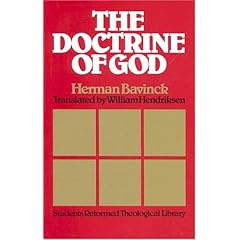
Herman Bavinck (1854-1921), a Dutch Reformed theologian, was a contemporary of Abraham Kuyper and B. B. Warfield, both of whom he knew well. He graduated magna cum laude in 1880 from Leiden with a double major in Systematic Theology and Old Testament. His doctoral dissertation was on the concept of the State in Zwingli's theology. Bavinck taught at the Theological Seminary in Kampen, Holland - where he also pastored - before accepting the position of professor at the Free University of Amsterdam. He is best known for his magnum opus, Reformed Dogmatics (Gereformeerde Dogmatiek, in 4 volumes). Bavinck is one of the most balanced and solidly Reformed theologians Holland ever produced.
Bavinck breaks down the Doctrine of God into 7 categories: God's Incomprehensibility, God's Knowability, God's Names, God's Incommunicable Attributes, God's Communicable Attributes, The Holy Trinity, and God's Counsel. Each of these of course is further subdivided in a logical format. Note that in the Dutch original, God's Names came after God's Incommunicable Attributes, and the editor does not give any rational for the change. The Doctrine of God is translated and edited by William Hendriksen, who of course gave us the red colour NT Commentary (completed by Kistemaker after his death).

Bavinck introduced the notion of organic inspiration of the Scriptures and also developed a solution to the infra/supralapsarian conundrum. Although Bavinck passed on in 1921, he remains a powerful force in Reformed theology. Several important Reformed theologians owe large debts to him, including Cornelius Van Til and Louis Berkhof.
From http://hermanbavinck.org/biography/
QUEEN OF THE SCIENCES
Theologians tend to be influenced by fashionable trends. Modern academic theologians try to avoid basing their arguments on the distinctive claims of Scripture. Although Bavinck was well versed in the modernist trends of his time, he did not succumb to their lure. He was a theologian of the Word. And what he said about theology should serve as a reminder for today’s academic theologians. In 1899 he stated in a speech that a doctor in theology is a servant of the church. His work consists of searching the Scriptures defending its truth, the training of men aspiring to become pastors, the perfecting of the saints in the building of the body of Christ. He wholeheartedly embraced the historic Reformed position: the Sacred Scripture is the source of theology. The Lord spoken! This is the starting point of all theology!
Bavinck was a Reformed theologian, whose dogmatics were rooted in the 16th century Reformation. According to him, no confession was as Biblical, broad, and truly catholic as the one of the historic Reformed churches. Theology is more than a discussion of church, religion, etc. In theology the church discovers her treasures. Without theology the church cannot exist. Bavinck was convinced that the Reformed churches needed an independent Reformed theology. Because, he said, “a church without a theology is a body without a head.” But without faith theology cannot exist.
For Bavinck, theology was still the queen of the sciences. He fiercely resisted the secularization of theology, which was already an issue in his time. Theology is born in the faith of the church and has the knowledge of God as its content. The fear of the Lord is its key element. “Theology is speaking about God, through God and to God.” It is a positive science, the knowledge of God in the face of Christ the Sent One of the Father. Religion and theology are like Mary and Martha, both are needed in the household of faith. Without the knowledge of God, there is no real life. This knowledge must be continually broadened and made clearer, and if necessary, cleansed through the Word. For this task theology is God’s ordained instrument.
The study of theology is sacred work, a priestly service in the house of the Lord, a consecration of heart and mind to the glory of God. The church’s and our personal confession of faith is thoroughly theological - a confession of the Father, the Son, and the Holy Spirit. Doctrine, therefore, is nothing but the unfolding of what God has revealed to us in His Triune Name and sealed in baptism. Whether he addressed theologians or politicians, Bavinck was always the theologian. For example, at the 1891 Christian Social Congress, he spoke about the general Biblical principles and their practical implications, which can offer a solution for social questions.
PREACH THE WORD
Bavinck confessed that the sermon was the most important part of the worship service. The preaching of the Word of God is the determinative mark of the church by which each congregation is formed. The sacraments are subordinate to the Word. They are without value on their own. They are nothing less and nothing more than the visible Word. Protestant churches are the churches of the Word. Jesus rules through the Word and the Spirit, and especially through the spoken word. Bavinck had little patience for pastors who did not study. The congregation has the right to hear the Word of God explained. When the pulpit wants to regain its power, the preacher must be a student of the Word, search it in all its riches and depth, in its unity and diversity.
Bavinck said that we know so little about the Scripture. There are still so many hidden treasures never enjoyed as yet by the congregation. Pastors are treasure hunters. The pastor who dares to come with a sermon without diligent and proper preparation has not trembled before the majesty of the Word! In other words: The study of the Word is the pastor’s primary duty. Congregations and pastors do not forget Bavinck’s message to the churches! Congregations should not be satisfied with sermonettes, stories and anecdotes. Bavinck urges pastors to hasten, so that when the Son appears, we can say to Him that we have kept His Word and have not denied His name, and that we know Him and the power of His resurrection and the fellowship of His suffering.
No comments:
Post a Comment